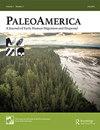学术期刊在古生物学科学殖民主义中的作用透视
IF 1.7
Q1 ANTHROPOLOGY
引用次数: 0
摘要
摘要学术期刊制定了政策,在全球范围内规范在研究中使用敏感的医学、生物、化学和遗传数据时必须遵守的特定协议。然而,古生物材料似乎被排除在外。我们进行了一次提交政策搜索,以测试殖民主义背景下这一法律差距的程度。结果表明,尽管大多数期刊都遵守广泛的道德准则,但它们并没有系统地提供有关化石许可证和收集和储存规范的信息,以及其他相关数据(N=108,亚洲和北美>80%,欧洲和拉丁美洲>65%)。这个问题影响了教育、经济和科学发展,使非法贩运永久化,并助长了科学殖民主义。有必要实施化石处理的强制性政策,包括在期刊提交指南中进行道德和法律管理,并要求将这些信息纳入材料和方法部分。本文章由计算机程序翻译,如有差异,请以英文原文为准。
Perspective on the Role of Academic Journals on Scientific Colonialism in Paleontology
ABSTRACT Academic journals have developed policies that globally regulate the specific protocols that must be followed when using sensitive medical, biological, chemical, and genetic data in research. Yet, paleontological material seems to be excluded. We performed a submission policy search to test the extent of this legal gap in light of colonialism. Results show that, even though most journals adhere to broad ethical guidelines, they do not systematically provide information regarding fossil permits and specifications on their collection and storage, as well as other relevant data (N = 108, > 80% in Asia and North America, > 65% in Europe and Latin America). This problem impacts educational, economical, and scientific development, perpetuates illegal trafficking, and boosts scientific colonialism. It is necessary to implement a mandatory policy for fossil handling, including ethical and legal management in the submission guidelines of journals, and to request that this information is included in materials and method sections.
求助全文
通过发布文献求助,成功后即可免费获取论文全文。
去求助
来源期刊

PaleoAmerica
Earth and Planetary Sciences-Paleontology
CiteScore
3.70
自引率
0.00%
发文量
15
期刊介绍:
PaleoAmerica disseminates new research results and ideas about early human dispersal and migrations, with a particular focus on the Americas. It fosters an interdisciplinary dialog between archaeologists, geneticists and other scientists investigating the dispersal of modern humans during the late Pleistocene. The journal has three goals: First and foremost, the journal is a vehicle for the presentation of new research results. Second, it includes editorials on special topics written by leaders in the field. Third, the journal solicits essays covering current debates in the field, the state of research in relevant disciplines, and summaries of new research findings in a particular region, for example Beringia, the Eastern Seaboard or the Southern Cone of South America. Although the journal’s focus is the peopling of the Americas, editorials and research essays also highlight the investigation of early human colonization of empty lands in other areas of the world. As techniques are developing so rapidly, work in other regions can be very relevant to the Americas, so the journal will publish research relating to other regions which has relevance to research on the Americas.
 求助内容:
求助内容: 应助结果提醒方式:
应助结果提醒方式:


